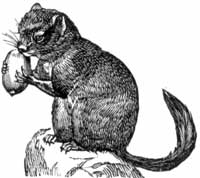|
| Query: Glirulus japonicus | Result: 2nd of 2 | |
Dormouse (Order: Rodentia, Family: Gliridae) - Wiki
| Subject: | Dormouse (Order: Rodentia, Family: Gliridae) - Wiki
| |

| Resolution: 200x178
File Size: 7338 Bytes
Upload Date: 2007:09:27 22:39:42
|
Dormouse (Order: Rodentia, Family: Gliridae) - Wiki
Dormouse
From Wikipedia, the free encyclopedia
[Photo] Dormouse. Published in Webster's New International Dictionary of the English Language, 1911, G & C Miriam Co. Springfield, MA.
Dormice are Old World mammals in the family Gliridae, part of the rodent (Rodentia) order. (This family is also variously called Myoxidae or Muscardinidae by different taxonomists). Dormice are mostly found in Europe, although some live in Africa and Asia.
They are small for rodents, with a typical length of about 2-3" (70 mm). Dormice typically feed on fruits, berries, flowers, nuts and insects. They are largely but not exclusively arboreal and nocturnal animals.
One of the most notable characteristics of those dormice that live in temperate zones is hibernation. Dormice can hibernate six months out of the year, or even longer if the weather remains sufficiently cool, sometimes waking for brief periods to eat food they had previously stored nearby. It is from this trait that they got their name, which comes from Anglo-Norman dormeus, which means "sleepy (one)"; the word was later altered by folk etymology to resemble the word "mouse". The sleepy behaviour of the Dormouse character in Lewis Carroll's Alice's Adventures in Wonderland also attests to this trait.
Dormice breed once or twice a year, with four being the typical size of a litter. They can live for as long as five years.
They were considered a delicacy in ancient Rome, either as a savoury appetizer or as a dessert (dipped in honey and poppy seeds). The Romans had a special kind of terracotta jar known as gliraria used to rear dormice for the table.
Currently, the earliest fossil evidence of dormouse species in Europe is placed in the middle Eocene. They appear in Africa in the upper Miocene and only relatively recently in Asia. Many types of extinct dormouse species have been identified. In the current (Holocene) epoch, the family consists of 34 species, in three subfamilies and (arguably) 10 genera:
Classification
Subfamily Graphiurinae
Genus Graphiurus (African dormouse)
Species Graphiurus angolensis (Angolan African dormouse)
Species Graphiurus christyi (Christy's Dormouse)
Species Graphiurus crassicaudatus (Jentink's Dormouse)
Species Graphiurus johnstoni (Johnston's African dormouse)
Species Graphiurus kelleni (Kellen's Dormouse)
Species Graphiurus lorraineus (Lorrain Dormouse)
Species Graphiurus microtis (Small-eared Dormouse)
Species Graphiurus monardi (Monard's Dormouse)
Species Graphiurus murinus (Woodland Dormouse)
Species Graphiurus nagtglasii (Nagtglas's African dormouse)
Species Graphiurus ocularis (Spectacled Dormouse)
Species Graphiurus platyops (Rock Dormouse)
Species Graphiurus rupicola (Stone Dormouse)
Species Graphiurus surdus (Silent Dormouse)
Subfamily Leithiinae
Genus Chaetocauda
Species Chaetocauda sichuanensis (Chinese Dormouse)
Genus Dryomys
Species Dryomys laniger (Woolly Dormouse)
Species Dryomys niethammeri (Niethammer's forest dormouse)
Species Dryomys nitedula (Forest Dormouse)
Genus Eliomys (Garden dormouse)
Species Eliomys melanurus (Asian Garden Dormouse)
Species Eliomys munbyanus (Maghreb garden dormouse)
Species Eliomys quercinus (Garden Dormouse)
Genus Hypnomys (Balearic dormouse - extinct)
Species Hypnomys morphaeus
Species Hypnomys mahonensis
Genus Muscardinus
Species Muscardinus avellanarius (Hazel Dormouse)
Genus Myomimus (Mouse-tailed dormouse)
Species Myomimus personatus (Masked Mouse-tailed Dormouse)
Species Myomimus roachi (Roach's Mouse-tailed Dormouse)
Species Myomimus setzeri (Setzer's Mouse-tailed Dormouse)
Genus Selevinia
Species Selevinia betpakdalaensis (Desert Dormouse)
Subfamily Glirinae
Genus Glirulus
Species Glirulus japonicus (Japanese Dormouse)
Genus Glis
Species Glis glis (Edible Dormouse)
http://en.wikipedia.org/wiki/Dormouse
| The text in this page is based on the copyrighted Wikipedia article shown in above URL. It is used under the GNU Free Documentation License. You may redistribute it, verbatim or modified, providing that you comply with the terms of the GFDL. |
|
^o^
Animal Pictures Archive for smart phones
^o^
|
|